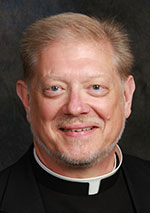That All May Be One / Fr. Rick Ginther
Festival shows universal Church embraces reality of diversity
 My father was a quiet man. Even so, he had some sage sayings which have stuck with me over the years.
My father was a quiet man. Even so, he had some sage sayings which have stuck with me over the years.
One was: Reality is reality. Deal with it.
This saying helped me navigate a good deal of living. “On the river denial” did not bob the lives of the Ginther children!
The diversity of human cultures, races, languages and religions is a reality. To deny such is to do violence and live impoverished. It breeds white supremacy, ultra-nationalism, religious radicalism and triumphal religiosity.
Last month, I invited folks to the Festival of Faiths from 1-5 p.m. on Sept. 22 at Veterans’ Memorial Plaza in Indianapolis.
This month, I want to provide some motivation for attending the event and documented reasons from teaching documents of the Second Vatican Council for embracing the reality of diversity.
The “Dogmatic Constitution on the Church” (“Lumen Gentium”) outlines the varieties of religions in the world (#14-16). It states clearly the basic relationship all humanity has in seeking the divine and in seeking truth. From that search has emerged many religions. Reality.
The “Declaration on Religious Freedom” (“Dignitatis Humanae”) says that religious liberty is a right found in the dignity of each person. No one should be forced to act in a way contrary to his or her own beliefs. In short, “do unto others as you would have them do unto you” as applied to one’s right to religious freedom.
The “Decree on Ecumenism” (“Unitatis Redintegratio”) announces “that the separated Churches and communities … though we believe them to be deficient in some respects, have been by no means deprived of significance and importance in the mystery of salvation. For the Spirit of Christ has not refrained from using them as means of salvation which derive their efficacy from the very fullness of grace and truth entrusted to the Church” (#3).
The “Declaration on the Relationship of the Church with Non-Christian Religions” (“Nostra Aetate”) states that “the Catholic Church rejects nothing that is true and holy in non-Christian religions” (#2). It called for an end to anti-Semitism and said any discrimination based on race, color, religion or condition of life “is foreign to the mind of Christ” (#5).
The “Decree on Eastern Catholic Churches” (“Orientalium Ecclesiarum”) states that variety within the Church does not harm its unity. It further decreed that Eastern Catholic Churches should retain their own traditions.
The Church lives out this decree on many fronts: in our outreach to the separated Eastern Churches—Orthodox—under all popes since St. Pope Paul VI; and in the creation of the Code of Canon Law for the Eastern Churches in communion with Rome.
Equally important is the “Decree on the Church’s Missionary Activity” (“Ad Gentes”). It says that missionary activity should help the social and economic welfare of people and not force anyone to accept the faith.
This last document promotes the missionary work of the Church by focusing on human dignity. It calls for the Gospel to be preached through care for human beings. We also, of course, must preach it through words.
All of these documents clearly state that proclamation of salvation brought by Christ continues even as we relate to the diverse religions and practices in our world.
That is the work to which we are called. Jesus himself met with, touched and taught Jews, Greeks, Romans, Tyrinians, Pagans, Sidonians, Samaritans, etc. from the midst of his Jewish religion and his faith in the Father. How could we do less?
Come to the Festival of Faiths on Sept. 22. Visit the archdiocesan booths. See how the universal Church embraces the reality of diversity.
(Father Rick Ginther is director of the archdiocesan Office of Ecumenism and Interreligious Affairs. He is pastor of Our Lady of Lourdes Parish, Indianapolis.) †
 My father was a quiet man. Even so, he had some sage sayings which have stuck with me over the years.
My father was a quiet man. Even so, he had some sage sayings which have stuck with me over the years.